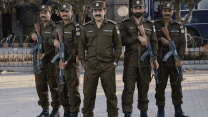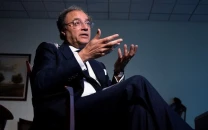Travel restriction: Polio counters at PIMS, Polyclinic to cater to greater number of people
Requirement that adults also take vaccine confuses visitors.

The polio counter set up in a tiny room next to the entrance of the main building of Polyclinic Hospital has been extended to facilitate people. PHOTO: FILE
The two biggest public hospitals of the capital have either increased the number of polio counters initially set up or the amount of space allotted to them to cater to the huge influx of intending travellers coming for vaccination.
The polio counter set up in a tiny room next to the entrance of the main building of Polyclinic Hospital has been extended to facilitate people.
A sense of confusion prevails among people who are planning to fly abroad regarding the inoculation as most of them believe polio vaccine is specifically meant for children.
“Due to the huge crowd, the area turned in to a fish market and it became very difficult to manage,” said an official at Polyclinic, who wished not to be named. And on top of it, the majority of people coming for the vaccination have reservations.
“The government should have started a mass awareness media campaign to educate people about the new travel requirement for which they need polio drops,” he added.
A polio counter was set up at Children Hospital, Pakistan Institute of Medical Sciences (Pims) and now a second one has been set up at the filter clinic, adjacent to the main out-patient department.
“Every day we receive over 1,300 people and the counter established earlier failed to cater to the huge number of people coming in due to shortage of space, therefore we have added another one to facilitate them,” said Shaheed Zulfiqar Ali Bhutto Medical University Vice-Chancellor Prof. Javed Akram.
Speaking to The Express Tribune, he said the first polio counter was established in a hurry owing to the huge number of people coming to Pims after hearing the news about a travel restriction imposed on Pakistan.
“It was difficult for people especially with children to stand in long queues for hours to get polio drops and certificates. To minimise inconvenience, another counter has been established,” he said.
“We did not have staff for this additional responsibility, so we trained people from our administration department who were earlier looking after finance and accounts to vaccinate people at these counters.” This is due to the absence of infrastructure at the already overburdened public hospitals. So far we have deputed six people, three at each polio counter,” he added.
Counsellors have been deputed at polio counters to clear away people’s apprehensions about polio drops as the majority believes that they are only meant for children.
Inamul Haq, 45, a resident of G-6/3 who came to Pims to get polio drops said, “I had never heard that elders should also get polio drops. For me, these were specifically meant for babies.”
Muhammad Ashraf, who had come along with his family to get polio drops said, “It has become very difficult to travel abroad for Pakistanis.” First we’ve to queue up outside embassies for an interview to get visas and now this additional formality of polio vaccination after standing in long queues at the hospital has made life even more difficult, he added.
Cops vs docs
Meanwhile, on Wednesday, a senior police official allegedly sent one of his subordinates to Polyclinic hospital demanding four stamped vaccination cards for him and his family members. When hospital officials refused, a doctor, identified as Dr Khurram, was threatened with dire consequences.
The doctor had submitted an application for the registration of an FIR at Aabpara Police Station against the police officials who threatened him.
Aabpara Police Station House Officer (SHO) Hakim Khan admitted there had been “some issue” after police officers threatened the doctor, however, he claimed there was no need to register an FIR yet.
“I will be able to share you details once I look into the matter personally,” he added. Khan claimed that he has requested the complainant to come to the police station so the issue could be amicably resolved.
Published in The Express Tribune, May 22nd, 2014.



















COMMENTS
Comments are moderated and generally will be posted if they are on-topic and not abusive.
For more information, please see our Comments FAQ